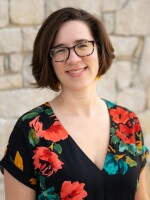Kansas City choral conductor Matthew Shepard has wanted to perform “Seven Last Words from the Cross” for more than a decade.
A modern choral masterwork, it tackles the Bible's dramatic story of the reflective moments leading up to Christ’s crucifixion.
Shepard was attracted to Scottish composer James MacMillan’s strong, clear use of musical metaphor, which adds a cinematic element to the sacred work. Words are whispered, strained, proclaimed, set against gnarly chords and frenzied, fidgety strings.
“You hear these hammer blows, clearly representative of being nailed to the cross, these hammer strikes in the sound of the violins: da-dat, da-dat, da-dat. It is insistent and incessant and unrelenting and beautiful and painful at the same time,” he says.
He first heard the piece on a Polyphony album, and immediately bought the score.
“I’ve had this score sitting on my shelf for at least 15 years,” he says.
That was before he’d even founded Te Deum, a 24-member volunteer chorus of music professionals and educators. He put it on the program for the chorus’s third year, but then replaced it with something else.
“I got appropriately scared of its virtuosic writing and switched,” he says.
The chorus lacked the power and the skills it needed to perform the piece back then, he says. But now that Te Deum has been around for a decade, it feels like the right material for this season’s final concert, which falls at the start of the Christian religion’s Holy Week.
The chorus is not affiliated with any church or sect, nor are concerts necessarily tied to the church calendar. But religious works are a staple of Te Deum’s repertoire, and the power of this particular piece, Shepard suggests, transcends one particular religion.

“For those who can connect this with their faith, there is an extra level there,” he says. “But for those for whom that doesn’t have a direct connection, you’ll still get to experience not only brilliant music but also you’ll experience all the emotions — and I think that part is still universal — you’ll experience love and pain and joy and loss. And those are all part of the human experience, regardless of creed.”
The BBC commissioned the work in 1993, broadcasting each of the seven movements on television during the seven consecutive nights of Holy Week. However, MacMillan always intended the work to be performed as a whole, taking the seven last statements made by Christ on the cross according to Gospels of Matthew, Mark, Luke and John, and weaving them with Latin and English text from the liturgy.
Along with the reminder of sacrifice, “Seven Last Words” conveys the sense of promise associated with the Easter holiday. Beauty shines through the piece, in sighing phrases, extended violin solos and the sumptuous blend of the chorus. There is also a moment when the sopranos sing “today you will be with me in paradise,” floating on a high C.
“I don’t think there is a better way that pure bliss and paradise can be represented musically,” Shepherd says.
And, he says, MacMillan “uses silence like almost no one else. He’s brave enough to put in great amounts of silence.”
The work is written for chorus and chamber orchestra. The orchestra, Shepard says, doesn’t just bolster the voices in accompanying roles. In fact, it is the strings, not voices, which represent Christ’s soul ascending to heaven.
“It’s doing much different material than the choir,” he says. “They are in conversation with each other.”
The piece draws on all the skills the chorus has developed throughout these past 10 years.
“The singers who have stayed with the group, we have all grown together. I can look very distinctly over the years and see each year, each season, a new harder piece,” Shepard says.
While the ensemble typically performs canonical sacred works, such as Bach’s Mass in B minor, Te Deum also performs modern works, like Schoenberg’s “Friede auf Erden,” and works by living composers, such as David Lang’s “the little match girl passion” and Ted Hearne’s “Privilege.”
“I thought, after we tackled those pieces, we all were another step better in our musicianship skills,” says Shepard.
“It’s extremely challenging, though I still think of it as quite accessible to the listener, because the challenging parts of it are so appropriately tied to the text. Where it’s challenging, it ought to be challenging because the moment is a challenging one. It’s not complexity for complexity’s sake.”
In contrast to MacMillan’s text-laden “Seven Last Words,” another piece on the program, also written in 1993, is Swedish composer Thomas Jennefelt’s “Villarosa sariladi.” An a cappella work exploring elements of American minimalism, Baroque practice and the Swedish choral tradition, it uses meaningless syllables, the Latin-esque language defining vocal color for a more instrumental treatment.
This is the final concert in a busy season of growth and connection. Along with its own performances this season, the ensemble was the opening act for Tallis Scholars and participated in the Boston Camerata’s “The Play of Daniel," both presented by The Friends of Chamber Music, and traveled to Oklahoma City as a presenting choir at the Southwest Division of the American Choral Directors Association conference.
Like the arrival of spring, Te Deum shows the promise of growth and connection.
Te Deum presents “Seven Last Word from the Cross,” 7:30 p.m. Saturday, March 24 at Our Lady of Sorrows Catholic Church, 2552 Gillham Rd., Kansas City, Missouri, 64108; and 3 p.m. Sunday, March 25 at Village Presbyterian Church, 6641 Mission Rd., Prairie Village, Kansas, 66208, with pre-concert lecture by Ryan Oldham at 2 p.m.
KCUR contributor Libby Hanssen writes the culture blog Proust Eats A Sandwich. Follow her on Twitter, @libbyhanssen.



